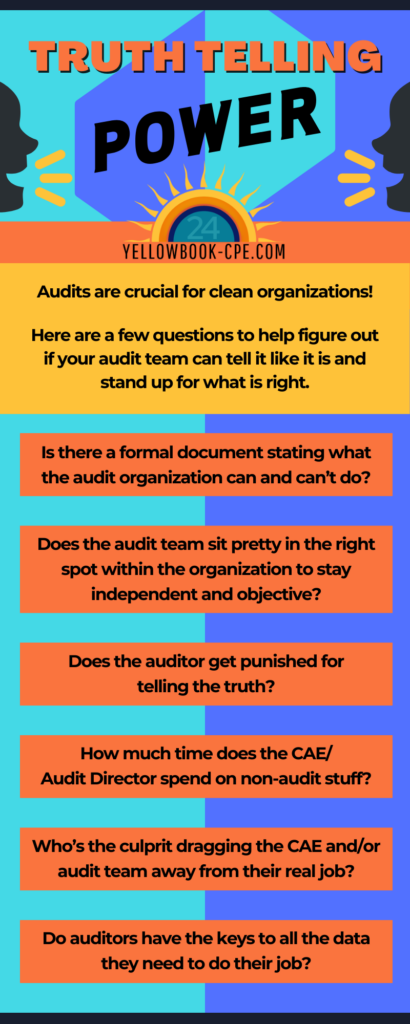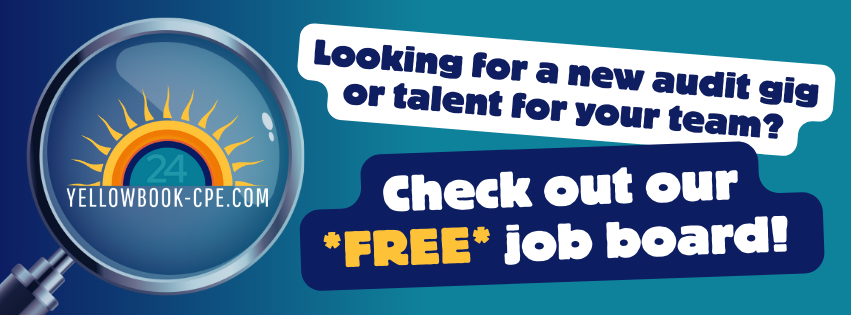 Does your audit organization have the power to get the info it needs and tell the truth?
Does your audit organization have the power to get the info it needs and tell the truth?
Audits are crucial for keeping organizations running clean. But does your team have power to identify and point out the inevitable disorder? In other words, can your audit team tell it like it is and stand up for what is right?
Here are some questions to help figure that out.
Is there a formal document stating what the audit organization can and can’t do?
Perhaps an audit charter, statute or any other official piece of paper laying out what the audit team is supposed to do. If there isn’t one, well, the team might just be winging it – which isn’t great when trying to enforce your authority.
Does the audit team sit pretty in the right spot within the organization to stay independent and objective?
If the audit team reports to someone who might sweat about what the audit will find, that’s a recipe for disaster. The team needs to be in a position where they can do their thing without worrying about whose toes they step on – preferably reporting straight to the top, like the board of directors.
Does the auditor get punished for telling the truth?
Punishment can be slow and subtle, or immediate and harsh. The first step is to identify the source and nature of the discomfort. Once you know where the pain is coming from, you can develop a strategy to minimize it and protect yourself from any backlash.
How much time does the CAE/Audit Director spend on non-audit stuff?
Your Chief Audit Executive (CAE) or Audit Director should be knee-deep in audits, not juggling a bunch of other projects that have nothing to do with auditing. Auditors should be focused on, well, auditing. But if management is constantly pulling them away for other projects, that’s like asking the chef to wait tables during the dinner rush. Not ideal!
Who’s the culprit dragging the CAE and/or audit team away from their real job?
If your audit team keeps getting roped into non-audit tasks, it’s worth asking who’s behind it. Is it the big bosses? The board? Maybe a rogue middle manager? Identifying the source is the first to stopping the distractions. Maybe they are trying to prevent the auditor from looking in their direction by sending them after squirrels.
Do auditors have the keys to all the data they need to do their job?
If your auditors can’t access the data they need, they might as well try to solve a mystery blindfolded. Make sure they have the keys to all the necessary data, or else the truth might stay hidden in the shadows.
Does your organization have truth telling power?
So, does your audit organization have what it takes to find the facts and tell the truth? Make sure you have clear guidelines, the right spot in the organizational chart and full access to the needed data. Otherwise, when you need to make a stand, you may be missing a leg or two.
Looking for high-quality and convenient CPE?
We have you covered! Our upcoming live webinars are a great choice if you want the learning to come to you. Just log on at the scheduled time and confirm you’re watching. Here are a few of our upcoming courses:
- Feb 5: Tech Fest for Government Auditors (6 CPE hours)
- Feb 13: The Audit Leadership Toolkit (2 CPE hours)
- Feb 27: Microsoft 365 Deep Dive for Government Auditors (4 CPE hours)
- Mar 3: The Art of the Audit Interview (2 CPE hours)
Need to do things at your own speed, but still get all your credits? Plan your CPE around your life, not the other way around! If you’re tackling a single audit or two this year, then the Single Audit Bundle is for you! Gain a solid grasp of how grants work and the requirements needed to comply with general grantor expectations.





 Yellowbook-CPE.com is registered with the National Association of State Boards of Accountancy (NASBA) as a sponsor of continuing professional education on the National Registry of CPE Sponsors. State boards of accountancy have final authority on the acceptance of individual courses for CPE credit. Complaints regarding registered sponsors may be submitted to the National Registry of CPE Sponsors through its website:
Yellowbook-CPE.com is registered with the National Association of State Boards of Accountancy (NASBA) as a sponsor of continuing professional education on the National Registry of CPE Sponsors. State boards of accountancy have final authority on the acceptance of individual courses for CPE credit. Complaints regarding registered sponsors may be submitted to the National Registry of CPE Sponsors through its website: